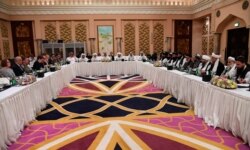The United States is set to formally restart peace talks with the Taliban insurgency, nearly three months after President Donald Trump abruptly suspended the year-long process aimed at finding a political settlement to the war in Afghanistan.
U.S. chief peace negotiator Zalmay Khalilzad arrived in Kabul Wednesday for meetings with government representatives and other Afghan leaders before heading to the Gulf nation of Qatar, where Taliban interlocutors are based, according to a State Department announcement. It did not give a date for Khalilzad’s visit to the Qatari capital, Doha.
“In Doha, Ambassador Khalilzad will rejoin talks with the Taliban to discuss steps that could lead to intra-Afghan negotiations and a peaceful settlement of the war, specifically a reduction in violence that leads to a cease-fire,” it noted. Taliban sources expect the meeting with Khalilzad will take place next week.
The U.S. statement said that during his stay in the Afghan capital, Khalilzad will follow up on Trump’s recent Thanksgiving Day visit to the country, the site of America’s longest war, and discuss “how best to support accelerated efforts” to get all parties to Afghan-to-Afghan peace negotiations.
The Afghan-born American diplomat led his team in nine rounds of talks with the insurgent group in Qatar before Trump canceled them on Sept. 7. Trump cited a spate of Taliban attacks in Kabul that killed a U.S. soldier among others.
At the time, the two adversaries in the 18-year-old war had come close to concluding an agreement that could have set the stage for a phased withdrawal of U.S. and allied troops from Afghanistan.
"The Taliban wants to make a deal and we’re meeting with them and we’re saying it has to be a cease-fire and they (the Taliban) didn’t want to do a cease-fire and now they do want to do a cease-fire,” Trump said last Thursday during his meeting with Afghan President Ashraf Ghani at Bagram Air Base.
But the Taliban insist that under the deal it negotiated with the U.S, the insurgent group had committed itself to observe a cease-fire with foreign troops to facilitate their drawdown and open peace talks with Afghan stakeholders for ending decades of hostilities in the country.
Insurgent officials say, however, a cease-fire with Afghan security forces will be on the agenda when the intra-Afghan negotiations begin. Those talks, they maintain, will he held with representatives of the larger Afghan society where government officials will participate in their private capacity and not as Kabul envoys.
For their part, Ghani’s aides insist any peace negotiations with the Taliban must be led by the Afghan government. Taliban-Afghan talks remain a daunting challenge for Khalilzad and his team to deal with, say analysts.
The Taliban, which controls or influences nearly half of Afghan territory, refuses to engage with the Kabul government, dismissing it as an illegitimate entity and a product of the "American occupation” of Afghanistan.





